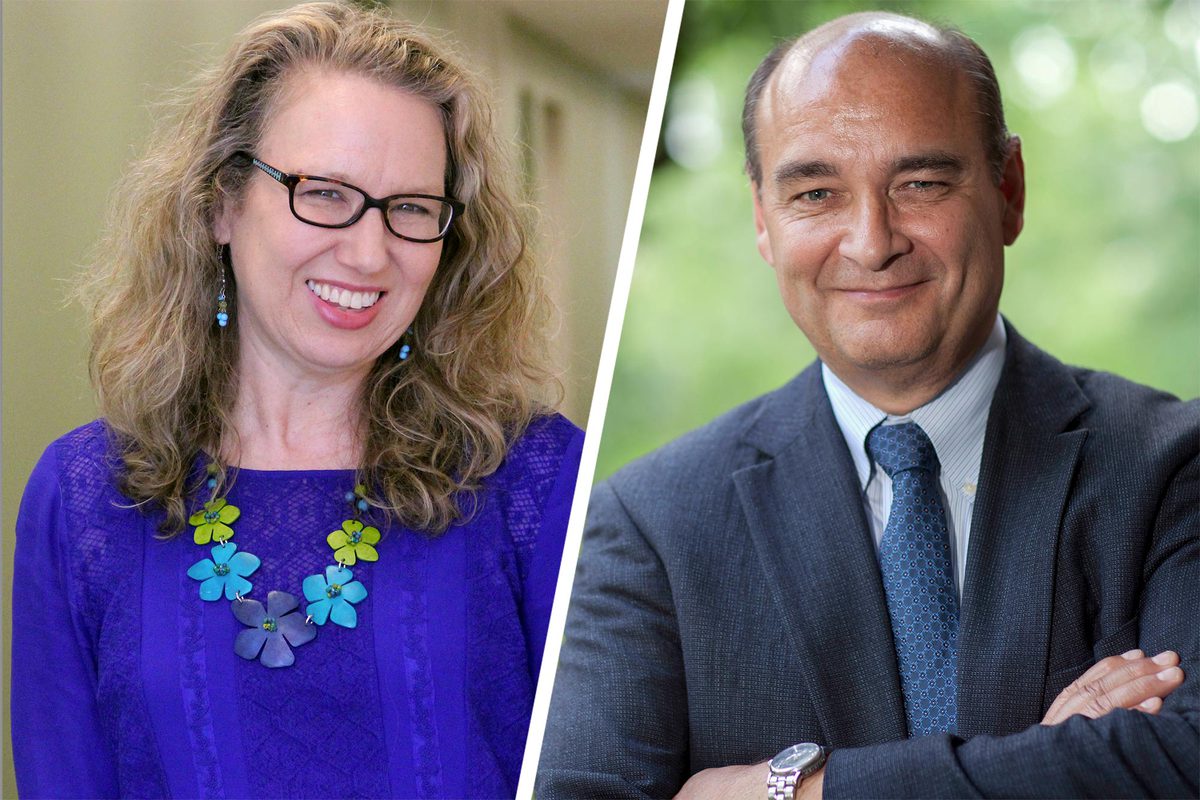From March for Our Lives to the Global Climate Strike, youth activism grabbed the national spotlight in 2019. To find out what’s going on with today’s teenagers and how our understanding of adolescence has evolved, we spoke with Nancy Deutsch and Patrick Tolan, two leading researchers on youth development in the University of Virginia’s Curry School of Education and Human Development.
Tolan is the Charles S. Robb Professor of Education, as well as a professor in the Department of Psychiatry and Neurobehavioral Sciences in the School of Medicine. In 2009, he founded one of the country’s first cross-university, multidisciplinary centers focused on youth: The UVA Center to Promote Effective Youth Development, or Youth-Nex. Deutsch, a professor of applied developmental science and research, statistics and evaluation, became the second director of Youth-Nex in 2017.
As the center celebrates its 10-year anniversary and prepares to host a conference on Grounds this week, Tolan and Deutsch shared how our understanding of adolescence is decidedly different than it was 10 years ago – and what they hope to see in the future for America’s teens.
Q. Take us back to 2009, when Youth-Nex was founded. What was going on in youth development research back then?
Tolan: I spent the first 25 years of my career focusing on children growing up in the inner city, and trying to think about and test methods of supporting families and schools for successful development – but through a prevention lens. How do you prevent pernicious life challenges from keeping kids or families from succeeding?
At the time of the start of Youth-Nex, there was a growing interest in trying to look at youth as a resource to society and as capable people. UVA, and Curry in particular, saw this as an important focus and secured support to start a center focused on the integration of research and practice around this idea of, “How do kids develop into capable, interested, contributing people?”
It was a very important step forward for the field, and UVA was one of the first places to have that kind of multidisciplinary approach to this critical issue – the future of youth in our society.

Nancy Deutsch and Patrick Tolan are two leading researchers on youth development in the University of Virginia’s Curry School of Education and Human Development. (Contributed photos)
Q. How has our understanding of adolescence and youth development evolved over the past decade?
Tolan: Rather than focusing on protecting kids from risk or helping them overcome deficits, it’s about, “What capabilities do adolescents have? What kinds of resources do they need?” That shift has been substantial. I think there’s an increasing recognition that youth need to be active directors of their own development.
When you think about youth movements today, they’re organized and led by youth. You have youth who are not only trying to speak up for themselves around issues they care about, but they’ve now gone to where they are engaging parents and adults in community conversations. They’re not just getting to be at the table – they’re literally organizing and inviting and managing the table.
Q. In this new climate, how do we – adults, teachers, researchers and parents – best support the adolescents in our lives and positive youth development in general?
Deutsch: One way that adults can really support young people is by, first of all, really understanding the developmental stage of adolescence and the needs of adolescents as individuals.
“Young people are really actively thinking about who they are going to be in the world. They want to feel that they belong, and they’re searching for a sense of purpose and meaning. ”
- Nancy Deutsch
We tend to carry two narratives about the adolescent brain that can compete with each other. One is, once you get to adolescence, it’s too late. That’s the frame I think we tend to use when discussing issues related to juvenile justice or discipline. Then, the flip side is that their brains are immature.
What’s really important for adults to understand is in what places each of those statements are true. There are certain decisions that adolescents are very good at making. For example, there’s no reason why a 16-year-old can’t engage in the kind of thinking and reasoning that it takes to vote. On the other hand, in highly emotional, reactive contexts, and particularly in the presence of peers, they should not be held to the same standards of adult behavior.
The other thing that I think adults need to understand is that young people are really actively thinking about who they are going to be in the world. They want to feel that they belong, and they’re searching for a sense of purpose and meaning. The more that adults can provide opportunities for young people to begin to see themselves as meaningful contributors to the world – that’s important.
Q. Youth-Nex is hosting a summit this month focused on moral reasoning, dialogue and democracy. What’s unique about the way that youth engage with these topics?
Deutsch: Young people, oftentimes, are very attuned to senses of fairness and justice. They are also very good – and this is one thing that adults do tend to be good at recognizing in teens – they’re very good at pointing out adult hypocrisy. And they’re quite comfortable pointing it out.
They’re also more prone to take risks, which is developmentally appropriate. They’re learning to be their own person; that is risky. But that also means that they are more willing to take risks in what they see as possible. So when they push for social change, when they look at the world, they’re more willing to go out on a limb.
Then, of course, they can’t vote, so they have to find other ways to engage if they’re going to try to make a change. But that also makes them, in many ways, more open. I think that we really need that – to be able to see a little more possibility.
Q. As Youth-Nex heading into its second decade, what is your vision for what the center, and the field of youth development, could accomplish in the next 10 years?
Deutsch: The broader the collaboration, the bigger the impact. I’m very focused on building the field in terms of connecting research to practice, and connecting researchers to communities.
And by communities, I include both young people and adults. I’d really like to build capacity for young people to be a part of the process. I think we need to bring youth voice more into the center – not just in programs, but in research. That also means helping to build the capacity of both groups to do that, and training the next generation of scholars to be able to work in that way.
We’re really trying to take this collaborative approach, and that’s where I would like to bring it in the future. Figuring out what each of these units and organizations brings, in terms of scholarship, practice, engagement with communities – and figuring out how we work together to build the field.
My hope is that Youth-Nex is part of a broader movement across the field to really change our narrative about young people and change the way we think about and talk about youth and therefore the opportunities that we give them.
Q. What do you find most personally fulfilling about working with youth and youth development?
Tolan: It’s not a small thing that this university was started based on the idea that unless there is an enlightened and informed next generation, society is not going to succeed and flourish. And these days it seems a very vital idea, so it’s great to feel like you’re a part of that.
Secondly, it certainly is the case that how we train the next generation – how we understand how to promote things like justice and engagement and personal fulfillment – is going to be absolutely vital to the future of the world. So it’s the kind of work where you never wonder if it’s meaningful.
Deutsch: My mother tells this story about how when my brother and I were both teenagers, and she would tell people she had two adolescents at home, they would say “ugh” or give her some kind of pitying comment. But her response was always, “Oh, no, it’s really exciting. It’s such an exciting time.”
And that, to me, says so much. If every adult approached young people that way – it’s a really exciting time and it’s fun to support them in becoming who they are becoming – the world would be a better place. I find adolescents really inspiring, and I find that energy really exciting. I’m awed by their ability to see a better future and to push adults to go there with them.
Media Contact
Article Information
November 8, 2019
/content/qa-understanding-adolescence-2019

